#writing with diversity
Explore tagged Tumblr posts
Text
Happy New Year 2025 from WWC
Hello everyone,
Merry, cheery holidays! The WWC team and I have been making many silent strides closer to a writingwithcolor.org.
What we've been up to
While the going has been slow, we've made a lot of progress since raising donations from you guys to go towards a .org, which we've secured ever since. With this support and encouragement, we plan to maintain the blog as a permanent resource.
As for progress and use of donations
Times have been busy and oh, so trying, but we're trying harder. Also, donations (and free time) have been going to good use.
For instance, we've:
Cleaned up (Added, removed, renamed, combined) WWC post tagging for clarity and consistency.
Created mirroring pages on new blog (e.g. navigation, stereotypes and tropes navigation, etc.)
Migrated all blog posts to our standalone blog (4000 some posts)
Maintained the URL ($12 a year, Writingwithcolor.org, hidden from view lately as we get closer to launch, although we've had it redirecting to Tumblr only until recently)
Overall building out blog content on the host site ($15.99 a month)
Next steps are to:
Finalize our theme (The fun part)
Finish blog post cleanup on the migrated posts (WIP!).
More actions at a latter date after publishing
Currently, I have been going through each and every post, one-by-one, to:
Edit, update and refine content
Fix broken links
Improve accessibility, particularly on image-heavy posts
A lot of changed in the world since 2014, so we want even our earliest posts to reflect today's standards or at least note if something is olden days or we have a more helpful post or resource since.
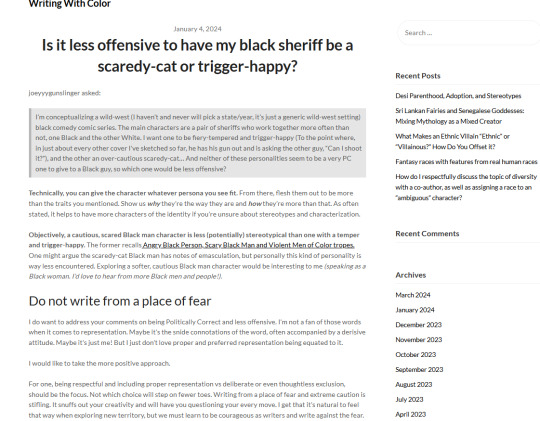
Example of a post on the .org. Final theme and colors not applied yet
Soft launch and new hopeful publish date
This is the end stretch before we have an official SOFT LAUNCH!
We're considering it soft since there are just some things we can't easily correct yet or will just make everything take even longer to wait on. We'll continue to cross-link between here and there as we work on getting it all centralized, though.
But to be clear, as intended, we'll continue to post on tumblr as well as long as it sticks around.
Our new prospective publish date is for Spring 2025, in which we can also re-open to questions, release new guides, invite new members, etc. etc.
But who knows - perhaps we will get a chance to answer some questions in between then.
Thank you and let's catch up!
All of your support and patience has been so appreciated. Thank you for sticking around throughout the extended hiatus. Nonetheless, I do hope our robust depository of existing answers, detailed guides, recommendations, reblogs and so on has been helpful with your creative, professional and academic pursuits.
What have you all been up to? What strides have you made in 2024 and what goals do you have for 2025? Have you published any works? We want to hear it all. Share with us on this post!
Wishing you all a happy and healthy 2025,
~Colette and WWC team
641 notes
·
View notes
Text
Hiiiiii,
I need some research help.
I'm writing a fantasy western novel and one of the characters is meant to be a black lesbian character who presents herself as male(primarily as a disguise to work as a bounty hunter/merc[also character things]).
He/She(they primarily go by he/him) would have a black Georgia accent, I would like to do the character and representation justice and I only moved to the states about three years ago and haven't had the chance to go to the south. I've found plenty resources showcasing white accents from that period but resources for black people are a lot more scarce. So I'm really just asking if anyone could point towards where to look where to look I'd be very grateful.
1 note
·
View note
Text
"sure you have twice the credentials - skills, languages spoken, experience, accolades, college degrees, even volunteer work - but the truth is that you're a DEI hire. see, i never really saw you as a person, only how you're different. i feel entitled to every job, and my ideal world is where i get to subjugate you. i automatically assume that you cannot be equally qualified simply because that would call my own qualifications into question... and you know why we couldn't do that.
DEI is just not fair! yes, there's statistics that many of you really are overqualified for whatever positions you've managed to manipulate yourselves into. but at the end of the day, if i feel left behind, i assume it's your fault. we need to bring an end to my sense of inadequacy, which means bringing an end to DEI.
now you all will be forced to get the job they way i did, through the time-honored great american tradition of nepotism, which"
#aaaaaaaGGGGGGGH#u know something? i was writing about how i got called a ''diversity hire''#LITERALLY THE YEAR I STARTED THIS BLOG#i WAS 19!!!!!#i watched the world change from it being ''one mean guy saying that''#to THE ENTIRE AMERICAN GOVERNMENT
2K notes
·
View notes
Text
So insane about the platonic relationships in wolf 359. The way the character writing is so strong they don’t need to rely on romance to make any connection convincing, compelling, and above all else fucked up and codependent.
The way Eiffel and Minkowski just Get each other, regardless of their previous hatred of each other. We go from Minkowski hating Eiffel’s guts (valid) to them truly needing each other. With them being the only two they can rely on in deep space, it makes such a compelling narrative that has you questioning whether they would even be friends in any other universe. The way their stories work, they could even be your classic enemies to lovers (looking past some marriages and how their characters just. Aren’t.) but wolf 359 shows us that they don’t need that relationship status to have one of the most compelling and delightfully codependent friendships in the podcast. We get Hera squeeling over them calling each other “friends” for the first time, (same, hera, same), narratively treating them with the same level of respect as you would a romantic pairing.
Maxwell and Jacobi hit this similar beat for me, they have no romantic tension but have grown this reliance and deep trust in each other. The scene where Maxwell slaps Jacobi what has to be like 7 times in a row and cusses him out for flaking on her before they dissolve into giggles really defines their relationship to me. They’re horrible people. They know it. They’re monsters. Together. And besties yay! In other media their relationship may take a backseat, and while theirs isn’t the forefront it’s certainly never minimized in impact on their individual characters. These two go together, need each other. (They’re a set do not separate)
I’d even extend this to commonly headcanoned romantic duos like Kepler/jacobi and Hera/eiffel. The podcast doesn’t rely on romance, even if there’s implication, but gives us the strongest damned character relationships. The best possible use of characters in each others own and intertwined stories. The bone chillingly good codependency that can only be built by truly Knowing a person, even the horrible bits. Even liking the horrible bits. If this isn’t peak fucking over relationship anarchy I don’t know what is.
#diversity win! your codependent horrible fucked up bad influences are besties!!#wolf 359#I could write essays on how good the character and relationship writing in wolf 359 is#obviously. from this post.#this was spurred by the end of episode 44#’let’s go be monsters’ HELLO IM GIING INSANE#me when the character and they do character thing#w359#alana maxwell#doug eiffel#warren kepler#daniel jacobi#renee minkowski#hera wolf 359#the character#rambling to the void here but damn this podcast is so good I adore when romance isn’t used as a crutch in relationship writing#aspec things
425 notes
·
View notes
Text
Saying there should be censorship on AO3 is one of the most bizarre, craziest things I have ever heard. Especially since AO3 was created to escape the chains of censorship.
#fan fiction#diversity in fanfiction#fanfic tropes#fanfiction writing#fanfic memes#fanfic#fandom#ao3 fanfic#fanfiction#ao3fic#ao3 memes#ao3 tags#ao3#ao3 writer#ao3 author#ao3 funny#ao3 link#ao3feed#censorship
277 notes
·
View notes
Text
cuetes

pairing: simon 'ghost' riley x latina!reader warnings: canon compliant violence. no beta so whatev a/n: i wrote this for @hahaifolded after we were talking about the lack of good latino representation in the fandom. hope you like it folded 🥺💕

There is something to be said about how easily Simon Riley can be bribed. Off the field, of course. He’d never put his team at risk on the field.
But with his third tamal in hand and the half drunk jarrito next to his elbow, Rudy can see how little it takes to sway him. He doesn’t get to sit with the realization too long before another body steps into the doorway.
“Who brought the ghost?” You lean your shoulder against the doorframe as you survey the stranger that’s sat in the midst of all your family members.
Rudy snorts, the unintentional pun missed on your part, while he shrugs. “You know me, always catching strays.”
Your gaze shoots over to Rudy and you raise an eyebrow, “Stray?” The incredulous tone of your voice is amplified by the once over you give Simon. “Aren’t strays supposed to be scrawny? Hanging on by a thread, pure skin and bone? He seems to be real well fed.”
Rudy shakes his head, laughter carries in his voice, “Well SAS does a pretty good job of keeping their boys working at full throttle.”
You shift, slightly, but enough for your uncle to see the way your body loses some of it’s ease.
“SAS? What are the brits doing on Mexican soil? They never venture this deep into latam.”
He grimaces, one of his hands sliding out of his pocket to rub across the face, “You know I can’t tell you that Mechas.”
You roll your eyes before turning from the party and trudging further into the orange colored kitchen, “And when the hell has that stopped you from telling me about what’s happening.”
“It’s different this time mija. We’re dealing with unprecedented circumstances.”
“Unprecedented?” Your hands grip the edge of the ceramic tile, white and blue cover the kitchen island that separate you and your uncle, “You had no problem telling me about the routes the mareros setup but you have a problem with this?”
“Mechas.”
Whatever Rudy is looking to say next is left unsaid as the pale stranger ducks into your grandmother’s kitchen. Despite the doorframe being a bit too small for him he has no problem standing at full height in the room. The home fitted with raised ceilings to allow for hotter air to rise and helping with the circulation of air during the heat waves.
He looks out of place in the room. In this whole ordeal, really. Family had travelled from all corners of the continent to gather at the matriarchal home, bringing with them the different flavors of Spanish. It made the English speakers scarce, and those who were there were easier to spot, especially with an accent that’s not heard around Las Almas often.
Your eyes narrow, eyebrows drawing together, “What are you doing here?”
Simon’s eyes meet Rudy’s before they’re on you again, “Eating.”
If it’s an attempt at a joke it falls flat, annoying you further.
“If this is what the SAS considers their best I worry for the state of that island.” You scoff and turn around towards the pot holding the warm atole.
You focus on pouring yourself a cup of the warm liquid, missing the look exchanged between the two men. The creases around Rudy’s eyes deepen as his worrisome gaze settles on you.
Simon can’t help the clench he feels in his gut at the sight. He’s thankful there’s no one to worry for him the way you worry for your uncle. He wonders for a split second if Rudy can feel the weight of your worries on the field. A constant weight and anchor pulling him back to this house. To his family.
“Does Yaya know?”
“She doesn’t need to know my every move Mechas.”
Your back is still turned to him but he can still see you shaking your head, “Foreigners mean trouble. Yaya knows that better than anyone. So either you told her outright or you let her connect the dots himself by bringing him here.”
You turn, not bothering to look at either of them as you cross the kitchen in search of a spoon. Simon follows your movements across the kitchen, keeping Rudy in his peripheral as he observes the tightness in your shoulders.
“Mechas,” Rudy starts but he doesn’t get far before your glare cuts him off.
“Stop.” You place your cup down on the island with force. The liquid sloshes around the cup, circling the edge of the cup as if deciding if it wishes to spill. In the end it doesn’t, settling into itself again as the energy disperses.
“Don’t give me some bullshit promise you’re not even sure you can keep. Don’t tell me you’re coming back if there’s even a possibility you won’t.”
Simon’s been in Las Almas for a short amount of time, but he knows Rudy. Trusts this man with his life, he’s saved it a few times already. So it’s easy to follow the minuscule reactions of hurt at your words. He knows empty promises are one of the only things that keeps a soldier going. The belief that they’ll be able to make good on those promises.
No matter how many times others aren’t able to.
“I’ll bring him back.” The words slip out before he understands what he’s telling you. An idiotic thing to promise someone who he just now met.
You’re thinking much of the same if the way you glare at him is anything to go by.
“And who are you to promise anything to me?” The softness of your face is deceptive to the bite of your tongue. Simon has heard worse from men bigger than him, meaner, and yet your words slice at him the way a blade slices at skin. Quick, deep.
There’s molasses dripping down his throat, choking him, his words stick to it.
You scoff, “Your words are no good to me.”
Rudy leaves him no room to respond, stepping in and attempting to mitigate your concern. None of the words Rudy says tamp the fury in your eyes or the strange tight sensation Simon feels between his ribs.
Bringing Rudy back to you seems like the only solution for both.
—
The stranger brings Rudy back. Bruised, battered, and bloodied but alive. And in the end that’s all that matters.
There’s no words spoken between the three of you, a heavy silence fills the kitchen as you get to work on cleaning up your uncle. You pull rags from cabinets and fill shallow pails with cool water to tend to wounds. It’s a silent endeavor, only the straining of the rags filling the room with sound. You don’t know how long you tend to your uncle for, but by the time you turn to face his strange companion his water is murky too.
Rudy must have told him the rules of Yaya’s home because there’s no trace of military gear on him. The only evidence of the violence he’s experienced is the dark stain on his shirt. Whatever liquid soaked into the shirt darkens the black cotton even more. His jeans are caked in the familiar light brown color of the soil around Las Almas.
You stop the analysis as soon as you feel the bile rise in the back of your throat.
Instead, you busy yourself with grabbing both batches of murky water to drain out in the pila outside. You don’t have the energy to talk to your uncle right now, much less deal with the look he reserves for you when he comes back from missions. You just lather up the rags with zote and scrub them against the ribbed cement.
The water runs red for sometime before it slowly morphs to pink and then a slight cloudy view, until finally it’s clear. The hens cluck around you, Chancho also waddles nearby to investigate your movements as you wash.
You’re too focused on washing and not trying to think that you miss the stranger stepping out into the backyard with you. The hens don’t scare off, instead they cluck at him, winding themselves between his legs as they inspect him. Chancho does the same, slowly approaching him and sniffing around before the spotted pig decides there’s nothing important for him there.
“Questioning is the family trait then, yeah?” His voice is low, raspy, like he hasn’t spoken in days. Hasn’t had a drop of water in weeks.
You spare him a glance, not wanting to look at him for long, when his face catches your attention.
No new wounds, plenty of old ones, but the area around his eyes is covered in black. Giving him the look of a child with face paint on him. Instinctually, you wring the rag before stepping to him and starting to blot away at the black.
Whatever he’d come out to do is put on the back burner as he freezes at your movements. He barely breathes, eyes focusing on the focused look on your face as you drag the multicolored towel across his cheekbones. You don’t ask for permission as you gingerly take his jaw into your hand, moving his head every which way to get the eyeblack off of him.
“Is being pushy a family trait too?”
You scowl at him, the grip on his jaw tightening, “Is that what this is to you Europeans? We call it hospitality out here.”
“Invading someone’s personal space?”
“Taking care of someone’s son.”
He knows you don’t know anything about him, let alone the tragedy that was Manchester, but the words still manage to dislodge something in him. The idea that kind hands and homes are offered to children, no matter who they are.
He tucks that away to sit with in the future. Not now.
Now he focuses on the feel of your hands against the scruff on his jaw.
–
You’re on the outskirts of the room watching the conversation that swirls around the big wooden table. The extended that was local had gathered at Yaya’s to discuss El Sin Nombre’s capture.
It was a pointless conversation that you had no interest participating in. Win or not, the work was pointless. One narco falls, a vacuum opens up, another takes their place. Tale as old as time, something the Mexican government surely wont fix with this singular capture.
Simon is next to you, sitting silently as the low conversation fills the rest of the room. He’s watching the table while you stare out the window at the stray dogs circling the street. It takes them a minute to find the food you’ve left for them but when they finally do you make a happy noise.
“Not interested in the familial debrief?”
You snort at his question, not even bothering to look at him directly, “This family has lived through the capture of dozens of narcos. I already know how this conversation goes.”
Simon doesn’t respond, just shifts his attention to you while you continue to pay him no mind.
“Honestly would be cheaper if you would stay longer to come and catch the next one. Saves you a flight.”
“This your way of asking me to stick around?”
You can’t help the noise you make at that, “If you stick around here longer than you need to I don’t think you’ll be of any good service to the force. I hear men incapacitated by the heat don’t do well.”
He huffs out a laugh, bringing the Modelo up to his lips for a swig. The cool malty liquid cuts through the heat that seems to have invaded his mouth, much like the rest of the city. He glances around the quaint family home, heat pressing into him in a way that never has before, and realizes just how deep Las Almas has sunk it’s claws into him.
He spares you a glance, still engrossed in the activities of the strays, and studies you for a second. Your body rests against the cushions, not at ease but not tense. Always alert, he thinks to himself. The same way he is back home. Never letting his guard down, assured in his own abilities, but never wanting to get caught off guard. It’s how he’s been living his whole life.
You let out a small sigh, cheek pressing into the cushion, the pressure of your cheek pushing out your lips just a bit.
He takes another drink.
Yeah. He can stick around for a little more
#ki writes#in the midst of everything that is going on it's more important for me to portray my latina readers as complex as possible#we are not stereotypes#we have incredibly diverse cultures that we carry with us everywhere#anyways i started writing this when i saw a piece where someone leaned so hard into the stereotypes i feel like we regressed thirty years#so i came to set this shit straight#ANYWAYS#okie dokie general tags teehee#ghost x reader#simon 'ghost' riley x reader#simon ghost riley x you#ghost x you#simon ghost riley x reader#simon riley x reader#simon riley x you#latina!reader
155 notes
·
View notes
Text

So it’s 2019, because that’s what it said on the screenshot I used to create the gif, and you’re casually browsing Netflix, grateful to be alive in a world where COVID or an internationally devastating shift in political alliances are but distant echoes of a future that may never come to pass, and you happen upon a movie that’s just been added, called BREACH.
Your Netflix synopsis says: When a man turns up dead on the shore of a remote mountain town and a local girl vanishes without a trace, it’s up to a local detective to put the pieces together. But when she rescues an attractive tourist off the side of the road, the investigation takes an intimate—and dangerous—turn.
And you’re like, ‘eh, nothing I haven’t seen before,’ (though the LGBTQ label is interesting), but then the preview starts autoplaying and IS THAT KATIE MCGRATH?! And it IS. So now you have no choice but to sit through the trailer.
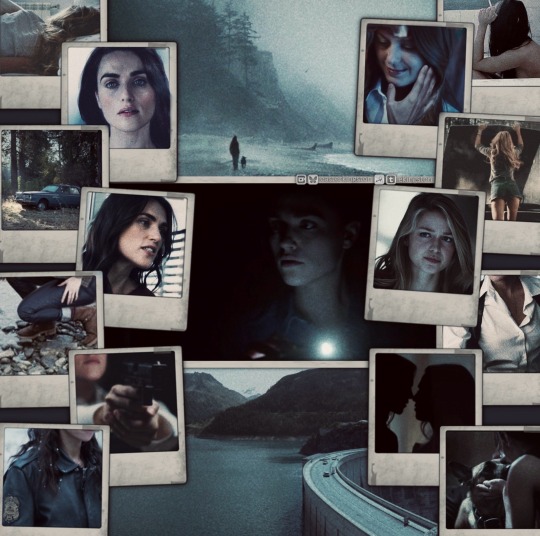
Nocturne by Blanco White is playing, calmly at first, swelling as it goes on. You’re presented with a wide shot of a towering dam, the camera slowly rising up the water-streaked concrete before breaching the top. An enormous lake BOOMS into view, jagged mountains beyond it, forming a serrated edge against the lightening sky. It’s early morning. Mist is rolling down the densely forested mountains and over the water.
(You wonder if this production used the same locations (or rather special effects) as Les Revenants did, and yes, it absolutely did, because I loved the atmosphere of that show and I adore mountain towns with enormous lakes and it is, to date, the most Hollywood version of non-Paris France I’ve ever seen.)
The wide shot narrows to a ground-level closeup of the pebbled shoreline, pulling slowly away from the water until we glimpse a piece of discarded police tape, fluttering on the breeze. The camera pans past a pair of sneakers and then a pair of uncomfortable-looking high heels, wobbling on the rocky beach. It’s a news crew, reporting live on the disappearance of a young girl. The camera pushes past them, staying at ground-level as it leads us into the woods, where we find the paws of a canine unit, splashing in a shallow mountain stream. There’s the sound of police radios, and then we see the boots of a police search party. We stop at a much smaller but otherwise identical pair of leather boots. The camera pans up at our detective—it’s Katie McGrath! Finally!
She looks amazing, obviously. For the sake of this miraculously being a supercorp AU, her character is a fair bit more acerbic version of our girl Lena Luthor, except we’re time traveling so she’s now in her early 40s, her dark hair greying slightly at the temples (let a girl dream), her jawline somehow sharper than ever, freckles proudly on display in the natural light. Her hair is hanging loosely over her shoulders, looking like it hasn’t seen a brush since she last laid down. Lena is wearing slacks, a wrinkled dress shirt and a men’s blazer that is slightly too large for her. She stares off into the woods, chin jutting, a muscle jumping in her jaw, her fingers absently playing with a pack of cigarettes.
CUT TO:
Early nighttime. A dark mountain road, lit sparsely, tall pine trees walling it in on both sides. We see over Lena’s shoulder, her hands on the steering wheel, as her cruiser’s headlights sweep over the shape of a woman, bent over the engine of her stalled car. The woman—blonde, mid-thirties, wearing cut-off jeans and a long-sleeved t-shirt far too thin for the late hour—turns when the car appears, squinting into the light. It’s Kara.
Lena comes to a stop behind her and rolls her window down. She calls out, “You need a ride?”
CUT TO:
The dimly lit interior of a spartan living room. Lena dumps blankets on the couch.
Kara asks, “You sure this is okay, me sleeping here?”
CUT TO:
Daytime, and we’re at the sheriff’s office. Lena, wearing a clean-but-barely-ironed dress shirt, drinks coffee as if her life depends on it. Mike Matthews, the sheriff’s deputy, makes fun of Lena’s uncharacteristic hospitality.
“What was I supposed to do?” Lena asks him, as we see a flashback shot of Lena watching Kara over the rim of her coffee cup, earlier that morning. “Next town’s hours away.”
We see Kara maintaining eye contact with Lena for a moment, the corners of her eyes crinkling, as we hear Mike telling Lena, back at the office, “You won’t even let me stay at your place.”
“You had bed bugs,” Lena points out. Then she raises an eyebrow, looking away, adding as a casual sidenote, “Plus she’s prettier than you.”
WLWNESS/SAPPHICTROCITY/LESBIANANIGANS CONFIRMED.
CUT TO:
It’s evening, and we’re in Lena’s kitchen. Kara is making dinner when Lena walks in, feeding scraps to—and this is very important! but only to me—Lena’s dog. Did I mention this is actually also a crossover with Person of Interest, and for absolutely no other reason than I need Lena to have Bear the Brilliant Belgian Malinois? “I see you made a friend,” Lena says. It’s unclear whether she’s talking to Bear or Kara.
The news is on, talking about the missing girl. Lena turns it off before settling into a chair near the open doorway, her legs splayed wide at rest. Bear immediately settles at her side, chin resting on Lena’s thigh. We all kind of want to be a Brilliant Belgian Malinois, in that moment. Kara asks, indicating the TV, “You think she’s still alive?”
“Could be.” Lena digs for her pack of cigarettes and pulls a lighter from a kitchen drawer, probably shoving an old walkman she’s had forever out of the way to get to it, scratching the course hair between Bear’s ears before settling back down. “‘Course if you asked me last week, I may have told you something different.”
Kara turns off the stove so you can all stop worrying, and starts plating the food. “What changed?”
Lena pauses while she lights her cigarette and takes a deep drag, the blue smoke drifting through the doorway outside as Lena savors it, slowly breathing out as gays the world over are forced to reconsider the merits of smoking. Like yes, it kills you in terrifying, excruciating ways, but LOOK AT HER. Lena watches Kara intently, but doesn’t answer her question.
CUT TO:
We see Lena in her bedroom, late at night, flipping through case files. Her fingers (which, EXTREME closeup, EXTREME CLOSEUPS OF HER HANDS THROUGHOUT THIS ENTIRE PRODUCTION, hover over a grainy picture of a young white man, wearing a red baseball cap. His back is turned so we can’t see his face, though if you hated hard enough back in the day you may have a hunch. As the camera circles around the room, Lena is replaced by Kara, the bedroom now bathed in golden morning light. She’s looking through the photos too, her fingers shaking. We see her react to the photograph of the ballcapped man, before quickly putting things back exactly as they were.
CUT TO:
An evening shot of the lake, the water wrinkling in the breeze, softly lapping at the shore. We hear the sound of something large hitting the water.
CUT TO:
A pee break, actually, and you’re gonna go ahead and grab a snack while you’re up. There sure is a lot of water in this movie. Wait, weren’t you just watching a trailer? Why does it feel like an hour has passed? Is it the hands? How many times have you hit that pause button? What year is it?
CUT TO:
Lena and Kara are at the Lake Pub. It’s dimly lit and smoky. Lena drinks whiskey. Across from her, Kara stirs a glass of soda with her pinkie finger. They’re regarding each other so openly you genuinely start to feel a bit faint.
“You’re looking at me like I’m one of your suspects,” Kara says.
You disagree. That’s not what suspicion looks like. You’re sure, because you’ve seen Katie McGrath look at approximately 99.9% of her female costars this way.
Lena keeps her gaze level, unflinching and forward. “I look at everyone like that,” she lies.
A beat.
“I don’t think that’s true,” Kara says.
You’re feeling suddenly thirsty, too.
CUT TO:
Red and blue lights illuminate the deep indigo sky over the lake. A body is being dragged from the water as Lena watches, clenching her stupendous jaw. Seriously, how is she growing hotter all the fucking time if storybook-princess-turned-mesmerizing-murderess was her baseline?
CUT TO:
Lena, sitting in her parked car. She slams her fist against the steering wheel. (Don’t worry, no hands were injured in the making of this film.) It’s overlayed with imagery of a burial service, a US flag draped over the coffin, a pair of grieving women—one middle aged, the other a pretty 20-something brunette, surrounded by officers in dress blues. Lena is there too, looking dashing in her uniform, but also like she hasn’t slept in a week.
CUT TO:
Lena is standing in the center of her living room, rubbing her brow with her long, spatulate fingers. Kara is hovering in a corner a couple of feet away, cautious. “Just say it,” she whispers. “You think I killed him.”
Lena releases a breath that is half-huff, half-groan. “I’m not sure it even matters anymore,” she says.
“How can you say that?” Kara asks. When Lena doesn’t answer her, Kara steps closer and touches her arm. Lena turns as if she’s going to shrug Kara off, and the instant you begin to wonder what the hell this movie is supposed to be about, you stop caring because Lena abruptly pulls Kara closer and they kiss, urgent and rough.
You’re not sure if your ears are ringing or if the sound you’re hearing is a chorus of lesbians all over the world exploding into cheers & wild applause.
As the music builds to a crescendo, we see a quick series of images:
Lena presses Kara against her bedroom wall, Lena’s lips at her jaw, her fingers undoing the button of Kara’s jeans before they slip inside her pants; your life flashes before your eyes; Lena points her gun at someone, but we don’t see who; Lena’s fingers support Kara’s chin as she gently dabs at her bloodied brow with a piece of gauze; headlights illuminate a figure in the road, mirroring Lena picking up Kara, but this time the smiling man in the red baseball cap (again seen only from the back) is the one pulling over & rolling down his window.
The dam’s floodgates open, a roar of white water pouring through.
The music stops abruptly as we end on a final, long shot. Lena stands on top of the dam, looking down, the sky above her, the dizzying depths below. The camera falls away, down down down, until it breaches the surface of the water and sinks into the dark water beneath.
Kara (voiceover, pleading, breathless): “If I go under, I’ll pull you down with me.”
Lena (voiceover, raw but full of conviction): “I’m a pretty good swimmer. And I have a feeling you are, too.”
CUT TO BLACK.
You blow out a breath and resign yourself to your fate. You hit the mute button, and press play.
Also I was proud of how this one manip turned out so I’m sharing the version that makes it marginally more clear that Kara isn’t randomly & uncomfortably touching her own face:
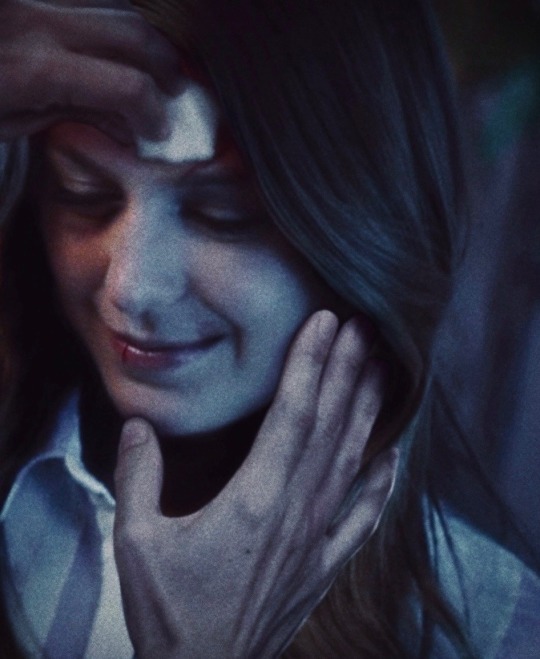
Like I said: SO MANY CLOSEUPS.
#also bear saves their lives probably.#mike matthews is the perp-slash-murdered man probably.#kara may have pushed him over the dam’s ledge in self defense maybe i dunno. not up to me i’m not writing it obviously#breach#supercorp manip#fic by ekingston#art by ekingston#animation by ekingston#by the way netflix realizes Katie McGrath brings all the girls to the yard and turns it into a series#it goes on for fourteen seasons. by the twelfth lena luthor’s hair has turned completely silver#bear never dies. lena and kara marry. then divorce. then reunite just before the show’s finale#the writing gets better each year as the show starts hiring new diverse voices#and learns to take itself less seriously#the final episode shows lena getting sworn in as the next president of the United States#the fans campaign to make it a reality
309 notes
·
View notes
Text
Wouldn’t my writing be worse off if I forced in elements like diversity?
If you are asking this question, you have yet to challenge the “default” of your culture’s media. Consider that the majority of modern Western media fill their casts with white men, and when there are women or POC, they stick out conspicuously. Many people view adding diversity as tweaking some white man characters by toggling race or gender. But this assumes that “white man” is some default, standard character template.
If you feel pressured to include diversity in your writing, distance yourself from this pressure and ask yourself why you feel it. If you feel attacked when seeing campaigns for more diversity or criticism of all-white, uninclusive media, sit with the discomfort and ask yourself why those who are different from you say they need diverse media.
These are people whose voices and faces are rarely visible in entertainment. Despite this, they enjoy an adventure as much as anyone, and have become accustomed to projecting onto white characters. Yet, when the reverse is asked of white audiences to acknowledge protagonists of color, it becomes a difficult ask. These character choices are immediately questioned, discredited, fought against, and accused of being “woke” or “unrelatable.”
This resistance reflects a larger issue: the imbalance between audiences’ empathy towards the majority/“default” and empathy towards those perceived as Other.
By mostly reading about white people, they become easier to relate to. By the same token, if we are not reading media and histories from the perspective of POC, we end up with more people who literally fail to relate to POC. When we talk about hope-deficits, increased alienation and lower self-worth among marginalized populations, underrepresentation in media is a big factor. Imagine for a moment: never the beautiful princess in the tower, never the badass hero riding dragons; always the two-second sidekick.
People of color are people and want to be seen and treated as such. Not as a burden to devote your time to, but people who have a place in the world, fictional or no. Really, writing a world in your story that is all or mostly white is more unrealistic, more forced—after all, there are far more non-white people on Earth. Becoming comfortable with diversity requires unlearning White as the Default and POC as the Other. It takes setting aside feelings of pressure to emphasize, open your heart and listen.
Further Reading:
“Diversity has gone too far!”
Diversity is for everyone.
Children and the Myth of Colorblind Youth
Those who read about aliens learn to emphasize with aliens. Those who read about wizards empathize with wizards.
---
This Q&A is an excerpt from our General FAQ for Newcomers, which can be found in our new Masterpost of rules and FAQs. If you liked this post, we have more recommended reading there!
-Writing With Color
#writing with color#writeblr#representation#poc representation#representation matters#diversity#diverse books#writing advice#writing tips#writers on tumblr#faq
2K notes
·
View notes
Text
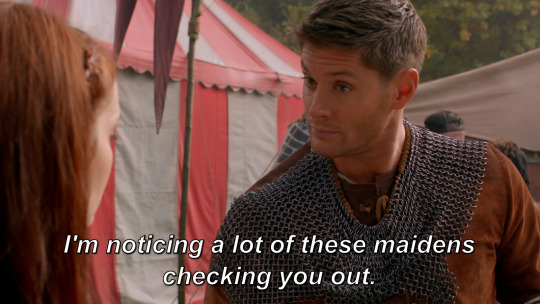
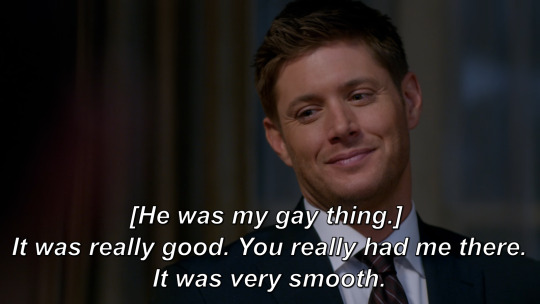
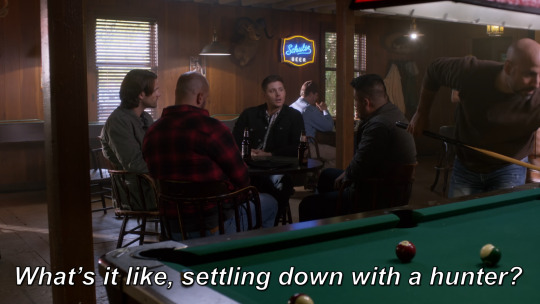
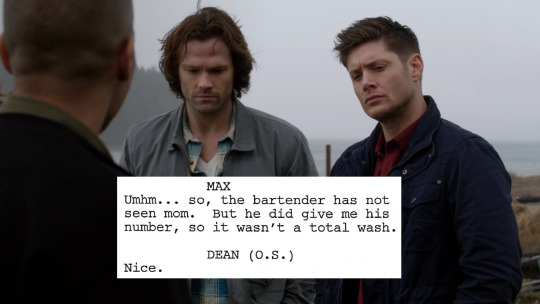
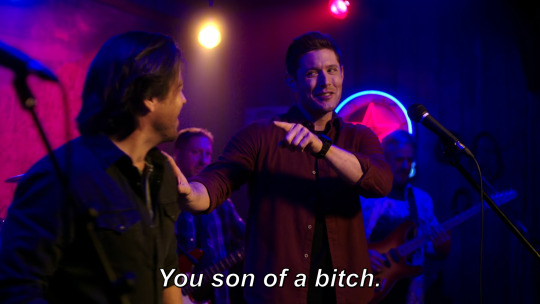
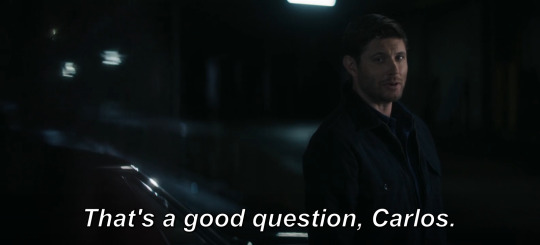
Dean complimenting fellow queer people on their game
Bonus inverse, trying to out-game someone to vicariously flirt for/with your presumed-but-not-at-all-straight friend who has no game whatsoever:
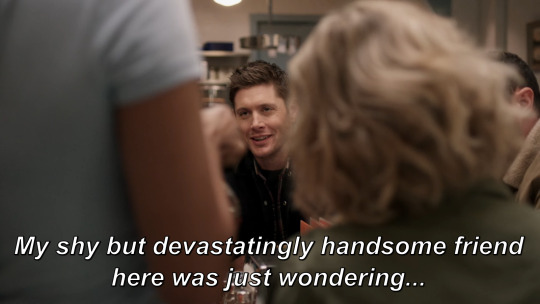
#it's striking how Sam will nod along in his Good Ally way but Dean is the one relating and being seen on this unspoken higher level#anyway can we add that scripted one to the censorship pile as a safe assumption? Yockey wrote it he'd Know#wild how transparently obvious it is spn's writing room was full of queer creatives+supporters who fought for diversity against corporate#it speaks to the experience because it's from the experience#people who refuse to get that are telling on their own lack of knowledge of The Life irl. I know what you are :)#supernatural#spn#the winchesters#dean winchester#destiel#spnedit#spn meta#parallels#dean is bi#spn is queer#8.11#8.13#11.19#12.20#15.07#spnwin 1.13#12.12#mine
1K notes
·
View notes
Text
I think one of the most annoying things about writing Yautja fanfiction is when I write female Yautja and everyone and their god damn mother has to come out and “Well ackshually 🤓🤚🏻” me with shit that isn’t actually canon.
No, it’s not canon that all females are 8ft+ tall.
No, it’s not canon that their planet is ruled by a Queen.
No, it’s not canon that they’re all bigger than males.
No, it’s not canon for this and it’s not canon for that.
Please for the love of FUCK! If you don’t like how I write and depict them, go read something else and stop fucking trying to pull that shit. If you disagree, don’t fucking sit there and act like you’re the end all for canon.
This is specifically to WattPad readers who want to argue with me in my comments.
Get bent, assholes. 😀
#I’m so fucking sick of the stupid comments bro#write your own shit where female Yautja are unlikeable monoliths with no individuality if that’s what you like#their sex is just as diverse in size and appearance as humans and I will fucking fight people who wanna sit here and argue in my own fic#skadi rants#rant#yautja#predator#female yautja#yautja women#predator franchise#yautjalover
130 notes
·
View notes
Text







Children of Rannoch: Notable Quarians aboard the Rayya
Children of Rannoch - A Quarian Overhaul (LE2)
(template)
#mass effect#mass effect mods#children of rannoch#masseffectedit#kal'reegar#veetor'nara#zaal'koris#shala'raan#daro'xen#han'gerrel#kar'danna#dailygaming#gamingedit#quarians#this took me 2 days to make pls clap#first time using a template it was rough going at first#but once i got into the groove it was alright#i could write 100000 words on how much i love this mod#the suit diversity - the different hoods and ornamental items on them#every quarian feels unique even the ones in the background#i don't think we appreciate han's missing eye enough#i love how its scarred over#xen's golden claws always get me along with raan's arm plates#i adore the different pieces koris and han have added to their suits#and their hoods! i tried my best to show off different details#having to look up their names exactly gave me whiplash when i saw how they look “canonically"#edain's edits
454 notes
·
View notes
Text
I am p convinced most of those posts complaining about books where characters constantly introduce themselves by their microlabels are popular mainly with people who have never read or seen a book like that. Same with the complaints over "poly lesbian barbarians in space" marketing
Look. Guys. Listen.
1. Marketing books by labels shouldn't be the sole detail given, obviously
2. The reason people do it is because it actually works far better than marketing based on plot. People do, in fact, care about seeing repsentation because many identities still have very little representation out there. Advertising based on this Does Better. People ignore books they haven't heard of, indie books, all the time— authors need to advertise instead to those communities looking for representation. As an author who has tried various appeals back in the day. I can promise you this is why. Most authors I've spoken to about this agree reducing your book down to tropes and rep feels Ugh, but unfortunately, it works.
3. The discussion around it, and the writing of marginalised identities, so often turns hostile and exclusion based. "I hate when a character says they're asexual it should only be hinted at" do you know how long it could only ever BE hinted at?
4. Obviously the execution varies and should make sense. Of course it's off if a very historical novel suddenly uses modern slang. Of course it can be cringe. Of course it can suck. Okay.
5. But how much are you actually encountering stuff like this in your reading, versus seeing people complain and agreeing "that sounds like shit"? It's... a vastly overstated problem.
6. You guys need to read more indie books, where you can find all kinds of representation, subtle or explicit.
7. Every post on the topic is full of notes just talking about Hell Followed With Us. I agree that book was pretty silly with its post-apocalyptic cast fighting over identity politics but also if any group was going to fight over labels in the angel apocalypse it's pretty realistic for it to be 16 year olds living in a LGBTQ community center. Like tbh. Checks out
#random rambling but ive seen a couple posts going around and like i get it very much but#this was the kind of thing i got annoyed over a decade ago and its gotten big again. weird to say#but when i was 15 i recall being like “ugh i hare when people talk about what theyre writing based just on diversity”! and then#yeah it turns out people just ignore indie books and books they havent heard of! so to market it you need to appeal to people looking for it
191 notes
·
View notes
Text
writing about hanfu: a guide
so! you have learned what "hanfu" is! congrats!
now i have to tell you, very politely, to forget the word "hanfu".
in most xianxia or historical chinese settings, where characters are assumed to be speaking in chinese, &/or have never been outside of china? all "fu" (clothing) is "hanfu" by default.
because most chinese people (mainland AND diasporic!) are han chinese and han chinese have been the ruling majority for pretty much all of china's history.
(primary exceptions are the mongolian-lead yuan dynasty & the manchu-lead ming dynasty but, in chinese fiction, it is always non-han chinese garments that are specified as such)
with this history in mind, it is almost always anachronistic to specify to chinese characters that something is chinese: the term "hanfu" was only invented when western dress became the assumed default!
so, when incorporating traditional chinese fashions in your english language work?
use descriptors such as "wide-" or "long-sleeved" when meaning these kinds of top garments
"frog-buttoned" or "wide-collared" when referencing manchu shirt styles (such as the modern qipao/cheongsam)
"trousers" is valid (if you're worried about being misunderstood, you can specify that they're "silk" or "wide-legged")
"robe" or "dress" for a single layer of full body hanfu; "robes" for multiple layers.
underwear is anachronistic pretty much everywhere, historically: historical dress uses an "inner layer" or "inner robe" for hygienic purposes. "shift" works too but is more associated with medieval european dress.
if looking up the history of sanitary napkins or loincloths feels daunting, you could sidestep the issue entirely with "undergarments".
"boots" or "slippers" for shoes (but you can also just say "shoes")
no one is wearing heels unless they're from a video game
"stockings" for socks
fabrics can be safely assumed to be "silk" (rich elite/inner layers of the middle-class); "cotton" or "linen" (commoners/inner layers/when exercising). you can also just say "cloth" or "fabric".
(other fabrics did exist historically, wool & hemp for example, but stereotypical hanfu moves like silk and most xianxia characters end up rich enough for it)
most closures will be tied, buttoned or belted. hooks are plausible and so are clasps. zippers do not exist.
(unless you're in a modern setting where characters are regular people buying off taobao)
generally speaking, you only need to use another language's terminology when there is no english equivalent or there is a strong cultural nuance that would be missed. the latter is only true of hanfu when worn IRL, in the modern era, by real people (typically at graduations or weddings).
for more specific terms and insights on traditional chinese dress (hanfu & otherwise), i recommend checking out @ziseviolet and other dedicated chinese-by-chinese fashion bloggers.
if you've been hesitant to write in a historical chinese setting, i hope this post has reassured you that you don't need to learn pinyin to do it. it's scary to write a culture you're unused to! these tips are chinese-specific but the same logic broadly applies to all non-eurocentred cultures.
(the big exception is the names of people and places: don't translate these into english until you have a REALLY strong justification for it. even then, don't treat machine translation a being a reliable source when it really isn't.)
i am but one person with approximate knowledge of many things: these tips can help ENG writers keep readers immersed in CN settings. that's all.
#writing tips#xianxia 101#mo dao zu shi#svsss#tian guan ci fu#honkai star rail#genshin impact#the apothecary diaries#ne zha#atla meta#guardian#erha#cdrama#xianxia#wuxia#diverse tolkien#essos#have i covered all the mainstream bases yet#star wars#there we go
147 notes
·
View notes
Text
RiverClan Refugees
Gorseclaw and Lizardtail want to join ThunderClan because they watched Harelight, their only other family, get publicly executed in front of them
They are trying their hardest to be useful and polite while being refugees in ThunderClan, and get mistreated for the effort-- having their food preferences mocked, getting told they're taking up space, hearing a steady stream of slurs, etc
After one more mass shaming session where Squirrelstar asserts they won't be accepting new cats, Sunbeam and Fernstripe join in on condescending them, and we get this;

"It would have felt bad turning them away, but if they chose to go home (AFTER BEING BULLIED FOR SEVERAL CHAPTERS) then there was no need to feel guilty"
This does not come across as these two earnestly missing home and choosing to go back; it comes across like they're accepting the fact that they are unwanted and getting out of dodge before it gets worse.
Honestly, I'm at the point where I can't call this a lack of self awareness. The difference between ThunderClan's treatment of Gorse and Lizard vs RiverClan's treatment of Wasp is obvious to me. The narrative is straightforwardly pro-xenophobic as long as it isn't overtly violent.
Social bigotry is fine. Good, even, to separate the "desirable" immigrants from the "undesirable" ones. What defines those categories? A good one will assimilate fully and leave their culture behind; a bad one only wants safety and a better life for their family.
Terrifying, imo, considering how the irl overton window has shifted on migration at the time of writing this in 2025. Does the spectre of the times loom over these words as I speak them? I hope not.
#Bones reads asc#Just in case this is stumbled across in the future and the context is unclear;#I am writing this as an American who watched the democrat's campaign for presidency completely buckle on immigration issues#The conservative position is mass deportation on the scale of ethnic cleansing#The liberal position had shifted to defensively citing their toughness on border/migration issues#There is essentially no opposition in the mainstream democratic party. The ground has been utterly ceded.#This is a notable change from (empty but present) liberal sentiment that 'diversity makes us stronger'#Life being reflected in art i suppose
191 notes
·
View notes
Text
Character Diversity Done Right: Beyond Tokenism & Forced Inclusivity
Diversity in storytelling isn’t just about ticking boxes or adding characters to look inclusive. It’s about creating real, nuanced people who enrich your world and resonate with readers. Let’s break down how to do diversity thoughtfully — without falling into the trap of forced inclusivity or the “token minority” trope.
✨ What Is Forced Inclusivity?
Forced inclusivity happens when diversity feels like an obligation instead of a natural part of the story.
Characters might be added just to meet a quota.
Their identities are mentioned but not explored or integrated meaningfully.
They often feel out of place or like an afterthought.
Why avoid it?
Because it can feel performative, shallow, or even disrespectful. Readers want authentic stories — not characters who exist only to “check a box.”
⚠️ The Token Minority Trap
A “token” character is often the only member of their group in the story, included to represent an entire community. They usually:
Have one-dimensional traits centered on their identity (e.g., the “sassy Black friend” or “nerdy gay sidekick”).
Are used to educate or explain cultural issues instead of being full characters.
Serve as a plot device rather than people with their own goals and flaws.
💡 How to Write Diversity Well
1. Make characters fully fleshed-out individuals.
Diversity isn’t just skin-deep or a label — it’s about who the character is inside. When you create a diverse character, ask yourself:
What motivates them? What are their dreams and fears beyond their identity?
How do their relationships shape them?
What quirks, flaws, or contradictions make them human?
This makes them feel real, not like a “diversity prop.” For example, a transgender character could be a talented detective who struggles with self-doubt, a funny sense of humor, and complicated family ties — not just “the trans character.”
2. Avoid stereotypes and clichés.
Stereotypes reduce complex people to a handful of traits. They can be harmful and alienate readers who identify with those characters.
Do your research! Read books, watch films, and listen to podcasts created by people from the community you’re portraying.
Avoid relying on common tropes like the “magical Native American,” “angry Black woman,” or “promiscuous bisexual.”
Give your character individuality that breaks expectations — maybe they defy norms within their own culture or identity.
Example
Instead of the “model minority” trope, write an Asian character who struggles with their own passions, insecurities, and family dynamics, making them a well-rounded person, not just a stereotype.
3. Include multiple diverse characters.
Having just one “diverse” character often makes them a symbol rather than a person. Real communities are rich, varied, and nuanced — and your story should reflect that.
Introduce more than one character from the same or different backgrounds to show variety.
Show how their experiences differ even if they share an identity. For instance, two queer characters might have completely different outlooks based on age, culture, or personality.
This avoids the “token” feeling and creates a more believable world.
4. Let diversity shape the world naturally.
In real life, diversity influences culture, language, food, traditions, and social dynamics. Your story world should feel lived-in and authentic.
Think about how diverse backgrounds affect worldbuilding — from holidays and cuisine to language and fashion.
Show interactions between communities, including cooperation, conflict, and blending of cultures.
Don’t just “drop in” diverse characters without integrating their identities into the story’s social fabric.
Example
In a fantasy city, different kingdoms might reflect distinct cultures with their own customs and dialects — giving your setting richness and depth.
5. Don’t make identity the only thing about them.
A character’s ethnicity, gender, or sexuality is part of who they are — but not the whole story.
Their identity can influence their worldview and experiences, but they should have other defining traits too — like ambitions, fears, or talents unrelated to identity.
Avoid writing characters whose entire personality or plot revolves around their minority status.
This lets readers see them as complex individuals, not just representatives.
Example:
A Black engineer who’s passionate about robotics and has a dry sense of humor — their race is important, but so is their love for tinkering and problem-solving.
6. Listen and learn from feedback.
No one gets it perfect on the first try. Writing diverse characters is a learning process.
Seek out sensitivity readers from the communities you’re writing about. Their insights can catch unintentional biases, inaccuracies, or harmful stereotypes.
Be open to constructive criticism and willing to revise your work.
Remember: it’s better to listen and grow than to defend mistakes that could hurt readers.
Final Thought
Diversity is about inclusion and respect, not obligation or tokenism. When you write with empathy and intention, your story becomes richer — and your characters become unforgettable.
💬 Got tips or experiences writing diverse characters? Drop them below or tag me — let’s learn and grow together!
#writeblr#writing community#writers of tumblr#writing tips#creative writing#vivsinkpot#amwriting#writing advice#character development#diversity in writing#diverse books#own voices#inclusive writing#fiction writing#diverse characters#sensitivity reader#avoid tokenism#writers helping writers#world building#vivwrites
74 notes
·
View notes